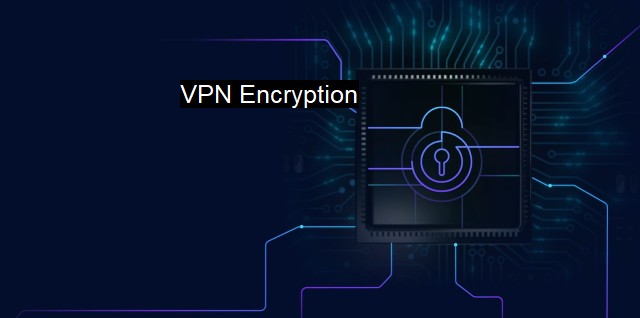What is VPN Encryption?
Understanding VPN Encryption: Fundamentals, Cybersecurity Contexts, and Risk Management Strategies
VPN encryption is a core component of cybersecurity used intensely by businesses, cybersecurity professionals, and everyday internet users worldwide. Primarily, it's crucial to consider how VPNs (Virtual Private Networks) work before delving into VPN encryption.A VPN creates a private network from a public internet connection, meaning it masks your internet protocol (IP) address, making your online actions virtually untraceable. VPNs are highly beneficial for enhancing online privacy by creating a private, encrypted network connection. It's crucial, especially in a world continually confronted with cyber threats and attacks, thus calling for more stringent security to protect sensitive data from nefarious cyber actors.
Primarily, VPN encryption underlie VPNs operations and services. It's based on cryptographic encryption, used to protect the data transmitted through the VPN tunnel between the client and the VPN server from being intercepted. When a VPN client connects to a VPN server, a secure, encrypted tunnel is created. All data packets transferred through this tunnel are processed by an encryption algorithm, converted into an indecipherable format. Only an encryption key can decipher and make understandable the data, ensuring data privacy, protection, and therefore, end-to-end security.
Different types of encryption protocols are imperative to note, each having its level of security strength and needs to be chosen based on the intended application. For instance, the Point-to-Point Tunneling Protocol (PPTP) utilizes 128-bit keys, bringing about weaker encryption compared to other methods. Layer Two Tunneling Protocol (L2TP) coupled with the Internet Protocol Security (IPSec) provides stronger encryption due to the 256-bit lengthy key but sacrifices speed.
Next, the Internet Key Exchange version 2(IPsec/IKEv2) act providers improved network connectivity with high-speed processing and security. OpenVPN, widely recognized in the industry, offers immense usability across numerous platforms. It’s well vetted, open-source, and employs SSL/TLS for the exchange of encryption keys, guaranteeing robust security. WireGuard, the newest encryption protocol, is lauded for its simplicity and high speeds while offering top-notch security, filling a long-standing void. Still, it's under development and test.
In terms of antivirus, VPN encryption achieves an essential synergy with its functionalities. Primarily, an antivirus application is designed to guard against malicious software, typically called malware such as viruses, worms, Trojan horses, and more. Many people conflate VPN encryption and antivirus software, but both serve different, albeit interconnected, purposes. While they work well separately, together they provide an unrivaled, complimentary synergy in cybersecurity.
Antivirus software rectifies issues from downloaded files or visited websites. It neutralizes malicious code before it can inflict harm, and organizes periodic checks on your system to nip any threats found in the bud. On the other hand, VPNs featuring encryption bring about anonymity online, chiefly permitting secure data transmission and receipt over unsecured connections. Together, they guard against most cyber threats.
Hence, it's crucial to combine an antivirus's protective capabilities with VPN encryption services, forming undisputed armor for your devices against cyber attacks. Computer users who understand this tend to stand less risk and vulnerability to cyberattacks, compared to those lacking foundational understanding and are gearless against the many cyber dangers they are prone to regularly.
Considering this, cybersecurity cannot be achieved by using antivirus mechanisms or VPN encryption in isolation. They need to be used collectively for wider coverage against various threats like hackers probing weaknesses to exploit, ransomware locking up files until a ransom is paid, identity theft, and more.
VPN encryption stands as a considerable pillar in the world of cybersecurity. It combines antiviral protection and privacy enhancement by driving anonymous internet navigation and secure data transmission down the encrypted VPN tunnel, substantially thwarting the chances both visible and invisible cyber threats posing grave snares to personal or business data safety.

VPN Encryption FAQs
What is VPN encryption?
VPN encryption refers to a security protocol used in Virtual Private Networks that ensures that all data transmitted between your device and the VPN server is secure and unreadable by any third party.Why is VPN encryption important for cybersecurity?
VPN encryption is critical for cybersecurity because it adds an extra layer of protection to your online activities, making it harder for hackers and cybercriminals to intercept or steal sensitive data. VPN encryption also helps protect against man-in-the-middle attacks, malware, and other cyber threats.What types of encryption are commonly used in VPNs?
The most commonly used encryption protocols in VPNs include AES, RSA, and SHA. AES (Advanced Encryption Standard) is the most widely used encryption algorithm, and it provides a high level of security. RSA (Rivest–Shamir–Adleman) is used for key exchange and digital signatures, while SHA (Secure Hash Algorithm) is used for message authentication.Can VPN encryption interfere with antiviruses?
No, VPN encryption does not typically interfere with antiviruses. Antivirus software is designed to detect and remove malware from your device, while VPN encryption protects your online activities by encrypting your traffic. However, it is always good to ensure that your antivirus software is compatible with the VPN you are using, so they work together seamlessly.| | A | | | B | | | C | | | D | | | E | | | F | | | G | | | H | | | I | | | J | | | K | | | L | | | M | |
| | N | | | O | | | P | | | Q | | | R | | | S | | | T | | | U | | | V | | | W | | | X | | | Y | | | Z | |
| | 1 | | | 2 | | | 3 | | | 4 | | | 7 | | | 8 | | |||||||